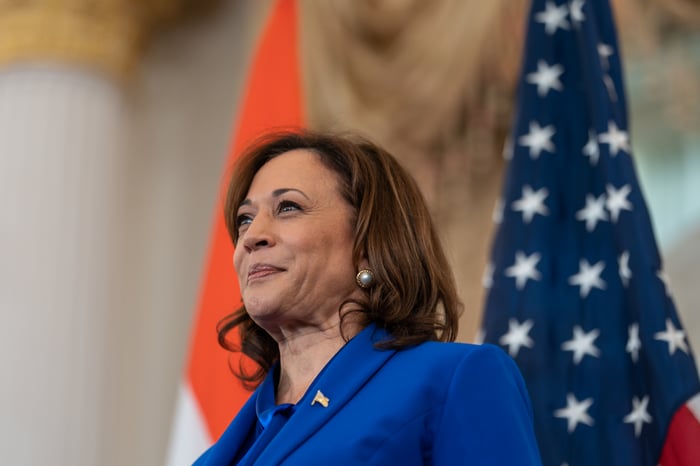In just a shade over a month, on Nov. 5, voters will head to the polls or mail in their ballots to determine who'll lead our country for the next four years.
Though not everything that happens in Washington, D.C., has bearing on Wall Street, the economic policies put into place by the incoming president and Congress do help shape the landscape for corporate America, and will, ultimately, have some level of impact on the stock market.

Current vice president and Democratic Party presidential nominee Kamala Harris. Image source: Official White House Photo by Lawrence Jackson.
Current vice president and Democratic Party presidential nominee Kamala Harris has laid out sweeping proposals, which include increased construction of new starter homes, lowering food and drug costs, expanding select tax credits for middle-class families, and raising the corporate tax rate by 33%.
While some publicly traded companies may be adversely impacted by Harris's policies -- this is an issue I'll touch on in greater detail next week -- there are also stocks that could greatly benefit if she's victorious on Nov. 5.
What follows are three unstoppable stocks that can soar if Kamala Harris wins in November.
NextEra Energy
The first magnificent stock that would have the necessary catalyst to rocket higher with a Kamala Harris victory is the nation's largest electric utility by market value, NextEra Energy (NEE 5.20%).
Although Harris has been noncommittal on whether she would require automakers to produce only electric and hydrogen-powered vehicles, as she proposed in 2019 when running for the Democratic presidential ticket, she's remained a steadfast believer in reducing greenhouse gas emissions and promoting clean-energy solutions. Her vote was the deciding factor that led to the Inflation Reduction Act (IRA) becoming law, which provides hundreds of billions of dollars for clean-energy initiatives.
Aside from its size, NextEra Energy differentiates itself from dozens of other publicly traded electric utilities by its focus on renewable energy sources. It currently has 72 gigawatts (GW) of capacity in operation, nearly half of which traces back to renewables. No electric utility in the world is generating more from solar or wind power than NextEra.
Even though interest rates have notably risen since March 2022, the company's management team has kept its proverbial foot on the accelerator when it comes to clean-energy investments. NextEra plans to invest a cumulative $85 billion to $95 billion from 2022 through 2025 in various infrastructure projects, and is forecasting between 36.5 GW and 46.5 GW of new renewables and storage capacity coming online from 2024 through 2027.
In other words, NextEra Energy is way ahead of the curve if the Harris administration were to impose clean-energy emission targets on electric utilities. To boot, these investments have substantially reduced NextEra's electricity generation costs and made it something of a growth stock (high-single-digit sustained earnings growth) in an industry known for slow growth.

Image source: Getty Images.
NVR
Another key tenet to Harris's plan if elected as president is to oversee the construction of 3 million new homes during her first term. Harris would offer tax breaks to homebuilders that cater to first-time buyers, and increase the funding available to local governments to encourage them to remove zoning restrictions that limit the number of homes that can be built.
Though such legislation, if enacted, would be viewed as a positive throughout the homebuilding industry, it would be especially good news for NVR (NVR -1.74%), which predominantly focuses on affordable, entry-level homes on the East Coast through its best-known subsidiary, Ryan Homes.
Despite its focus on generally lower-cost homes, NVR is consistently the most-profitable homebuilder, based on return on invested capital.
The company's not-so-subtle secret to success has been its asset-light approach. Instead of outlaying a lot of capital to purchase and develop land, it leans on lot purchase agreements (LPAs). With LPAs, NVR puts down a relatively small, nonrefundable deposit that gives it the option of building homes. Not having to outlay much of its capital has allowed it to handily outpace larger homebuilders in the growth department -- a 23% annualized earnings growth rate over the last five years.
NVR also has a mortgage banking segment that's likely to benefit during the newly kicked-off rate-easing cycle. Mortgage servicing is an ancillary segment for NVR, but provides a pathway for the company to keep first-time buyers within its ecosystem of products and services. A dovish Federal Reserve and a presidential candidate focused on ending a housing shortage is a dream scenario for NVR and its shareholders.
Mobileye Global
The third unstoppable stock with all the tools and intangibles needed to rocket higher if Kamala Harris wins in November is advanced driver assistance systems (ADAS) and autonomous driving solutions provider Mobileye Global (MBLY -1.72%).
Although Kamala Harris hasn't thrown her unwavering support behind the electric vehicle (EV) industry, as she did in 2019, she is an ardent supporter of clean-energy solutions. At the very least, we're likely to see policy proposals that focus on improved fuel efficiency and reduced carbon emissions for new vehicles if she's elected.
But newer vehicles are becoming increasingly reliant on technology for operating efficiency and safety. Harris's cleaner-energy policies, coupled with the prospect of import tariffs being off the table -- former President Donald Trump wants to impose tariffs on goods imported into the U.S. -- will likely provide a meaningful boost to ADAS supplier Mobileye Global. As Vice President, Harris has overseen the passing of the IRA and the Bipartisan Infrastructure Law, which provide for clean vehicle tax credits and investment in EV infrastructure.
Mobileye's EyeQ chips power its end-to-end SuperVision platform, which is comprised of 11 cameras and autonomous vehicle maps that grow smarter over time. If Harris simply keeps these clean-vehicle tax credits in place and oversees the buildout of clean-energy infrastructure, Mobileye should see demand steadily increase over time for SuperVision.
To add, Mobileye Global is sitting on an enviable amount of cash. It closed out the June quarter with $1.2 billion in cash and cash equivalents, and no debt. Even if EV sales hit a near-term rough patch, Mobileye Global has the financial flexibility to weather the storm and thrive over Harris's four-year term, assuming victory in November.





